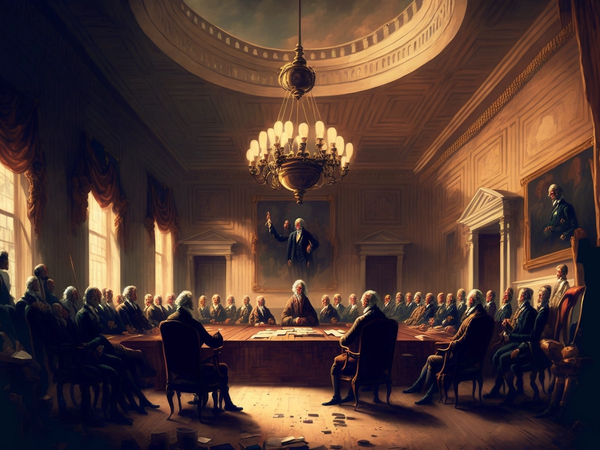Electoral College
Who has the power; is it the voice of the people, or is our nation's future in the hands of shrewd politicians?By Ari Bahat, Turner Merritt, Emiliano Garcia-López Attribution: Midjourney
Attribution: MidjourneyIntroduction
The Electoral College is one of the most controversial topics in our current political landscape. The electoral college is the body that elects the president of the United States; rather than voting directly for the president, populations vote for an elector to then cast their ballot in your political favor. Each state has the same number of electors as Representatives and Senators in Congress, and some may argue this favors states with smaller populations as the first two electors throw off the population ratio.
Say State A has five representatives, and State B is twice as populated as State A. If it was completely proportional to population, State B would have twice as many electors (10). State B would have 12 electors in this very real hypothetical, and State A would have seven electors. In smaller states, each vote has more weight than a larger state. Several times throughout the history of this nation, the winner of the popular vote lost, and in fact, 2 out of the last four presidents lost the popular vote. Leaving the question on the table, who has the power; is it the voice of the people, or is our nation's future in the hands of shrewd politicians? Below we will outline the various beliefs that each party holds and explain the political philosophy behind each of them.
Another factor in the electoral college process is the National Popular Vote Interstate Compact. It is an agreement among a number of states and the District of Columbia to give their electoral votes to whichever candidate wins the popular votes in the entire country. It is a possibly more democratic solution to the electoral college, as it gives more power to the popular vote. It has been suggested that this solution would favor Democrats. It must be noted that we at Crossing the Divide focus mostly on bipartisan, and not non-partisan politics. This is an issue which can greatly impact third-parties, which we will ask you to think about in the DQs.
Republican
In 2016, 47% of Americans supported the electoral college system, up from 35% in 2011. What was this driven by? Mostly a decisive swing in the Republican viewpoint to support the electoral college system. It has been alleged that Republican views against this system were greatly swayed by the recent elections of George W. Bush and Donald Trump, both of whom won their elections via the electoral college, having lost the popular vote. This does make political sense, as the basic principles of the Republican Party have remained steady, although perhaps more extreme, as the divide is widening, even though 54% of Republicans favored only using the popular vote in 2011, whereas only 19% did in 2016. A statistical observation is that flipping a core value in 5 years seems to have a circumstantial extenuating factor, and that factor could be the most recent wins using the electoral college. This makes sense because the hypothetical used in the beginning generally supports Republicans, as the smaller, more rural states are more likely to vote Republican. The originalist approach of the Republican Party affects their views, as they believe as much should be held intact in the original writing of the constitution as possible. The modern Republican Party believes that the popular vote also "opens the flood gates for possible corruption", along with corrupting the constitution itself. Perhaps an argument against democracy itself, but a simple rule of the majority is potential equivalent to mob rule, and the electoral college at least brings power back to the states. Massachusetts can't impose its will on Louisiana.
Democrat
Democrats, on the whole, believe the electoral system to be antiquated and consider it a useless relic spawned from a failed compromise between the popular vote and congressional selection. Americans had much less access to information on candidates, and electors would vote on their behalf because they weren't trusted to make intelligent, informed decisions themselves. This problem no longer exists; therefore, Democrats believe the system designed to solve it is now useless. Many Democrats and a few Republicans believe that the "faithless elector" is hugely problematic. This is when an elector abandons the population's voting decisions and elects who they want. In the 2016 election, seven electors were "faithless"; they voted against the views of those that elected them, meaning that Hillary Clinton lost five votes, and Donald Trump lost two. In future elections, a faithless elector could legally nullify the popular vote. Democrats generally hold more progressive viewpoints, believing that some aspects of the constitution need to be adapted for modern times.
Discussion Questions
- What was the original purpose of the electoral college?
- Should the electoral college be abolished?
- Is a totally Democratic state in line with the founding principles of this nation?
- Should we have a form of direct representation in our government?
- Does the electoral college further or hinder democracy?
- Is the National Popular Vote Interstate Compact a good idea?
- How does the electoral college help or hurt third parties?
Sources:
RepublicanViews.org. “Republican Views on the Electoral College | Republican Views.” Republicanviews.org, March 26, 2018. https://www.republicanviews.org/republican-views-on-the-electoral-college/.
West, Darrell M. “It’s Time to Abolish the Electoral College.” Brookings. Brookings, October 15, 2019. https://www.brookings.edu/policy2020/bigideas/its-time-to-abolish-the-electoral-college/.
Wikipedia Contributors. “National Popular Vote Interstate Compact.” Wikipedia. Wikimedia Foundation, July 21, 2019. https://en.wikipedia.org/wiki/National_Popular_Vote_Interstate_Compact.